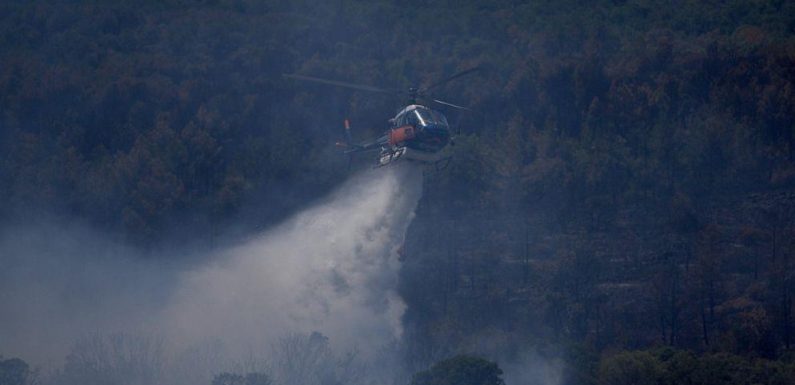
LE LUC, France — Firefighters have tamed but not fully controlled a huge wildfire blazing through the backcountry of the French Riviera, a regional administrator said Friday.
The prefect of the Var region, Evence Richard, told reporters that the fire was considered stabilized, meaning not spreading. But he warned that rising temperatures and a changing wind forecast for the weekend could bring more bad news.
“We can’t exclude a new restart of the fire,” he said.
The fire has killed two people since it started Monday, a man in his 50s who died at his home in Grimaud, about 12 kilometers (7.5 miles) inland from Saint Tropez, and a 32-year-old woman on vacation in the same village.
Now in its fifth day, the blaze has eaten through 8,100 hectares (20,015 acres) of forests and other vegetation, including vineyards.
More than 1,000 firefighters with 250 trucks worked through the night to secure the edges of the blaze so flames would not spread before daylight allowed flyovers by water-dumping aircraft to resume, the Var government said.
The blaze, which has forced the evacuation of some 10,000 people from summer campers to residents, is the latest among numerous large wildfires to have scorched the Mediterranean region this summer. Forest fires have left areas in Greece, Turkey, Italy, Algeria and Spain in smoldering ruins.
Hundreds of fires in Greece this month came in the wake of the country’s worst heat wave in about three decades that left shrubland and forests parched. The causes of all fires have not been officially established, although more than a dozen people have been arrested on suspicion of arson.
A major wildfire that has decimated a pine forest and burned homes northwest of Athens appeared somewhat abated Friday, although hundreds of firefighters were still working to fully contain the blaze.
The fire near the village of Vilia, about 60 kilometers (40 miles) from the Greek capital, broke out Monday. Firefighters had been facing particularly tough conditions, including lack of access roads into the dense forest, high temperatures, dry conditions and constantly changing winds, he said.
Many parts of the world have seen summer wildfires fueled by extreme heat and drought conditions. Scientists say there is little doubt that climate change from the burning of coal, oil and natural gas is driving such extreme weather events, and that the world will see more and more of them as the planet warms.
———
Follow AP’s coverage of climate change issues at https://apnews.com/hub/climate-change
Source: Read Full Article